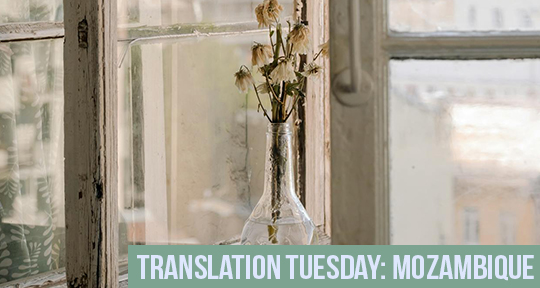This Translation Tuesday, we are honored to share with you an excerpt from the latest novel by the first woman to win Mozambique’s Prémio Literário 10 de Novembro literary prize. Here to tell you about this riveting tale of parallel love stories that traverse centuries is translator Beth Hickling-Moore herself: “Aruanda fluctuates between two stories, the first set in the 19th Century and the other in the 21st. In each story, prejudice, conflict and environmental destruction are destined to repeat themselves. In 1890, black servant Carina de Sousa is accused of witchcraft by the plantation overlord, along with her mother, Lina. What nobody knows is that Carina is in a secret and forbidden relationship with Pedro Lucas, the son of Carina’s boss, the captain. A scuffle ensues and Pedro Lucas is killed, leaving Carina pregnant with his mestizo child. The story then jumps back and forth between Carina’s story and the present day, in which professor Daniel de Barros —along with student Maria Cristina—embarks on a restoration project in the Aruanda region. As both stories develop in tandem, we discover that Daniel and Maria Cristina are in fact reincarnations of Pedro Lucas and Carina. As the professor and his students fight to save the Aruanda region from property developers who are destroying the landscapes just as the plantations did centuries before, we realise that Daniel and Maria’s love is similarly ill-fated. While Aruanda reflects on the country’s issues of prejudice, conflict and environmental destruction past and present, the novel does not feature the word ‘Mozambique’ at all: much like Isabel Allende’s Casa de los Espiritus is an allegory of national history without ever naming names, Aruanda takes place in fictional Aruanda, named after the Afro-Brazilian spiritual citadel of the same name, and considers whether postcolonial, post civil-war Mozambique is indeed a version of this utopia, or whether it is controlled by the same forces as it always has been. Aruanda will be of interest to a contemporary readership because it falls within the spheres of climate fiction, science fiction and race writing. Recent big-budget film and TV adaptations of novels such as The End We Start From and Leave the World Behind demonstrate the popularity of such genres, but very little climate fiction is published from the African continent, one of the regions most affected by the climate crisis. The book is also reminiscent of Octavia Butler’s classic, Kindred, in its historical episodes and supernatural elements.”
Aruanda is silent. Its solitude has risen, its melancholy dripping into the sea. I’ve never been to the Indian Ocean, but this is how I picture it: deep and still like the tombs of my ancestors who traversed its waters. Its quietude stretches right up to the large house belonging to the Prazo overlords: Captain Major Bento Noronha and his wife, Dona Luísa.
The dinner table is laid just so, just how Dona Luísa likes it. Tonight we are hosting young Doctor Fernando, the family physician. After coming to see Sargeant Pedro Lucas, he has been invited to stay for dinner.
Captain Bento and Doctor Fernando’s conversation lingers on banalities as the sweet scent of lilies tickles my nostrils. I inhale deeply and see Dona Luísa descending the granite steps, carrying a glass vase holding the flowers.
“It’s a pleasure to have you here, Doctor Fernando.”
“An absolute honour, Madam,” he responds politely, nodding in reverence to his hostess.

